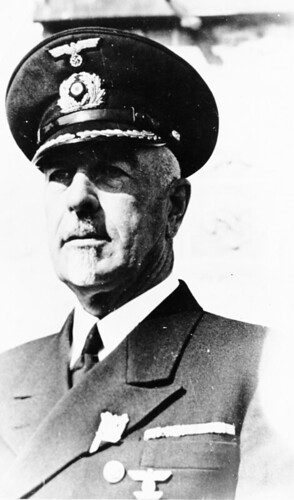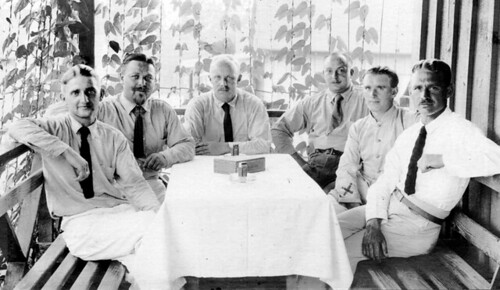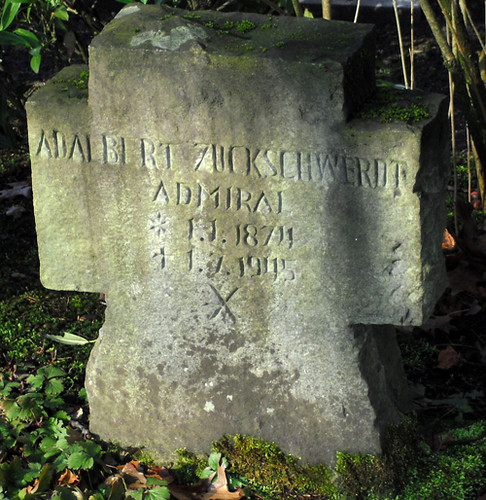Captain Adalbert Zuckschwerdt
Adalbert Zuckschwerdt (1874 – 1945) was the captain of the German raider SMS Cormoran and its successor SMS Cormoran II which sailed to Guam from Tsingtao (Qingdao), China in 1914 in the early months of World War I. For more than two years, Zuckschwerdt and his crew remained in Guam until the United States entered the conflict in April 1917, and the SMS Cormoran II was scuttled by the Germans in Apra Harbor.
Zuckschwerdt was born 1 January 1874 in the town of Worbis in central Germany to parents Adalbert Franz C. Zuckschwerdt and Math. (Mathilde?) Von Koch. He was the third and youngest of the Zuckschwerdt siblings, which included Franz and Frieda. He married his wife, Penelope Tsausopulo, on 12 October 1899 in Athens, Greece. The couple did not have any children.
Early military career
Zuckschwerdt entered the military as a midshipman in the Imperial Navy in April 1893, undergoing basic training on the Stosch in 1894, then moving on to the ship Gneisenau in 1895 and the Panzerkorvette (armored battleship) Baden. After completing basic training, Zuckschwerdt entered the German Naval Academy in 1896. Upon graduation, he was promoted to lieutenant and assigned to serve on the cruiser Empress Augusta in 1897 as an officer, and later, on the ships Sophie (1898) and the Loreley (1899). From 1900 to 1902, Zuckschwerdt was assigned to the artillery training ship Mars. In 1904 he was the artillery officer on the newly constructed heavy cruiser Prince Henry where he was promoted to 1st lieutenant. From 1904 to 1906, he was the 2nd artillery officer on the battleship SMS Roon.
From 1906 to 1909, Zuckschwerdt was an instructor at the German naval artillery school and the navigation officer on the battleship Hesse. He was promoted in March 1911 to 1st officer and a month later, to lieutenant commander, and continued his command until 1913. Later that year he was assigned as 1st artillery officer of the Roon which sailed to Sydney, Australia.
Zuckschwerdt was a respected officer, known for his quiet temperament and decisiveness. Cormoran historian and author, Charles Burdick, described Zuckschwerdt as:
…a large, handsome, mountainous man with wide, muscular shoulders, and a decisive personality. Rather than patiently explore a problem to its exhausted depths, he normally chose action and prompt decision-making. He was an ingratiating figure, known to virtually everyone among the naval units in the Far East. By temperament, a quiet man, he seldom raised his voice, never used profanity and avoided harsh exchanges as all costs. This quiet demeanor concealed a streak of innate stubbornness, which he camouflaged with a social consciousness not often found in either the German navy or among westerners in the Far East. His quick wit, sincere concern for others and easy manner made him a popular figure everywhere. He had been in the Orient for almost four years and had established an enviable reputation for fairness and discipline.
Charles Burdick
Korvettenkapitan Zuckschwerdt
By August 1913, Zuckschwerdt took command of the light cruiser SMS Cormoran which was stationed at the German colony of Tsingtao in China. With the onset of World War I, as the Cormoran was being outfitted for war, the ship’s engine was destroyed. She was replaced with an auxiliary cruiser which was renamed the SMS Cormoran II. Zuckschwerdt captained this vessel across the Pacific evading enemy warships until it finally stopped at the neutral American colony of Guam in the Mariana Islands.
Zuckschwerdt and his crew were interned, but welcomed and allowed to stay in spite of growing tensions between the United States and Germany. He did not get along well, though, with the naval governor, Captain William J. Maxwell, but was more at ease when Maxwell was replaced by Governor Roy Smith.
Throughout the Cormoran’s journey across the Pacific, Zuckschwerdt maintained order and discipline among the crew, keeping them at task either with preparing supplies or training exercises. Even during their internment, Zuckschwerdt showed genuine concern for the men under his charge, communicating continuously with authorities in Germany and the US to ensure their safety and well-being.
When the US finally entered World War I in April 1917, Zuckschwerdt was willing to surrender the crew, but ordered the scuttling of the Cormoran to prevent its being taken by the Americans as a spoil of war. During the Cormoran crew’s internment, Zuckschwerdt had secretly prepared for such a moment with a demolition charge in the coal bunkers when the decision to destroy the vessel would have to be made to avoid enemy capture.
When the first shots were fired at the Cormoran (which incidentally were the first shots fired by the US in World War I), Zuckschwerdt ordered the ship evacuated and blew up the vessel. Captain William P. Cronan, of the USS Supply, rescued and captured Zuckschwerdt. Despite the circumstances, Cronan called Zuckschwerdt a “brave man” for his actions in scuttling the vessel.
US Naval Commander Owen Bartlett, ordered to inspect the Cormoran’s coal supply shortly before it was scuttled, was also impressed with the German captain. He described Zuckschwerdt as, “a large, well-formed man, with jet black mustache and Vandyke [beard], always spotlessly attired, spoke English with the elegantness of the educated foreigner, was a gifted conversationalist, possessed a rare charm of manner, and, incidentally, must have been an able disciplinarian to have maintained the high morale evident in his personnel during their long sojourn in Guam.”
After the scuttling, Zuckschwerdt and his crew were taken as prisoners of war. The German crew was then transported from Guam and to the continental United States. According to researcher James Oelke-Farley, not everyone was impressed with what Zuckschwerdt had done, and was threatened by his crew with bodily harm for “recklessly and unnecessarily” sacrificing the lives of their shipmates.
Zuckschwerdt arrived at the POW camp in Fort Douglas, Utah, on 10 June 1917. Later, he and his men were transferred to another camp at Fort McPherson, Georgia. During this time, Zuckschwerdt reportedly was also involved, along with some other Cormoran crewmen, in an escape attempt in May 1918. For this, Zuckschwerdt spent 25 days in the disciplinary barracks. Captain Zuckschwerdt remained a POW until 1919 when the war ended. He was returned to Germany by the fall of 1919, and was promoted to Commander.
Life after the Cormoran
Zuckschwerdt traveled extensively to the United States following World War I. He lived in Berlin with his wife Penelope and engaged in the fur trade with his friend, Arthur Maeser, who ran a fur farm with ranges in Minnesota, Canada, Alaska and Germany. He last visited the United States in 1936, when the fur farm went into voluntary receivership.
During World War II, by then in his late 60s, Zuckschwerdt re-entered military service on 29 August 1940 and was assigned as the port commander of Nieuport, and in November 1940, was the port commander of Calais. In September 1943, he was promoted to the rank of Konteradmiral (rear admiral) and took over the Loire/French South Coast command. He also served as the commander of the naval defense at Languedoc. On 23 March 1944 Zuckschwerdt received the German Cross in Silver as Seekommandant Languedoc.
In May 1945, shortly after Germany’s surrender to the Allied Forces, Zuckschwerdt was taken prisoner. He died on 1 July 1945 at the age of 71 while in confined at Garmisch-Partenkirchen, a district in southern Germany. He is buried in Hövelhoff, a municipality in the district of Paderborn, Germany. His wife, Penelope, eventually returned to Greece, where Cormoran diver, researcher and author Herbert Ward was able to present her with one of her husband’s swords salvaged from the sunken vessel during one of his dives. She also continued to communicate with her husband’s comrades during their annual meetings after World War II.
For further reading
Burdick, Charles. The Frustrated Raider. Carbondale: Southern Illinois University Press, 1979.
Genealogy.net. “Familiendatenbank NLF: Adalbert ZUCKSCHWERDT *1874.” Last updated 7 October 2009.
Ward, Herbert T. The Flight of the Cormoran. New York: Vantage Press, 1970.


